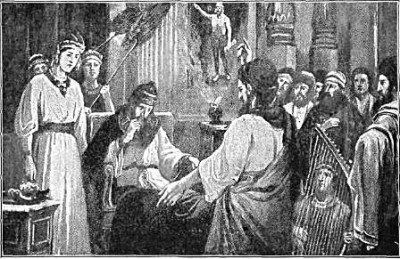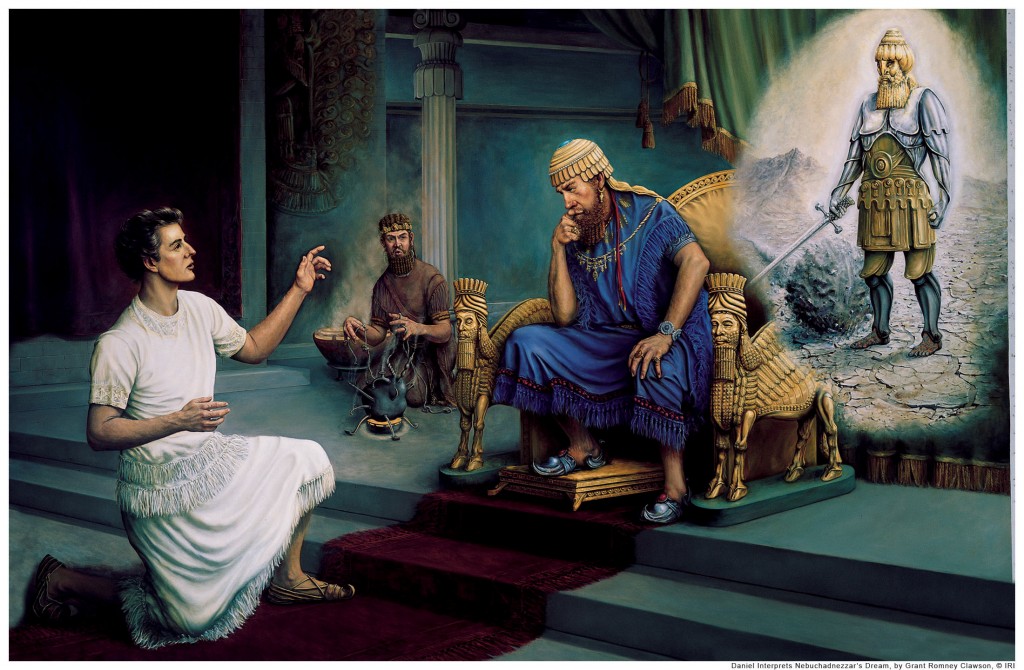Truly answer me… In judgment and in dream.
Nebuchadnezzar, “Ancient Babylonian inscription” (6th century BC)
Behold, a king shall reign in righteousness, and princess shall rule in judgment.
Isaiah the prophet (8th century BC)
The Terror of Dreams
An image, great and terrible, bright in glistening metals. A head of gold, breast of silver, belly of brass, and legs of iron. Stuff worthy of a nightmare, and that’s exactly where the king of Babylon met it. But there was more. As the king watched, a stone, untouched by human hands, was cut from a mountain and hurled at the image’s feet. The image shattered and became as “the chaff of the summer threshing floors,” and the winds carried the residue away. Then the stone grew and grew until it became a great mountain that filled the whole earth. Quite a big dream, even for a king.
King Nebuchadnezzar knew that what he had seen in his nightmare was a revelation, a divine message, of immense importance. He had to know what it all meant. So he called the wise men of Babylon … the magicians, the astrologers, the sorcerers … and demanded of them the meaning of the dream (Dan. 2:2). They gladly agreed to supply answers. They just needed to hear the details of the dream first. And there Nebuchadnezzar balked. “The thing is gone from me,” he said. As wise men and “diviners,” surely they could supply the details. And if they could, the king could trust their interpretation.
The wise men were horrified. It wasn’t possible. Only the gods could do such a thing. If only the king would. . . . But the king wouldn’t budge. Instead, he ordered all the wise men of Babylon destroyed. Ouch! If they couldn’t help at such a cosmically critical moment, what good were they?
The king’s soldiers began to collect all of Babylon’s diviners and astrologers for execution. And then they came to Daniel (v. 13).
The Interpreter of Dreams
Daniel was a young man, barely 20. He was a Jewish captive, ripped away from his home and family by the armies of Nebuchadnezzar. Here, in Babylon, he had undergone a thorough program of indoctrination in the magic, idolatry, Statism, and the ethnocentrism that was the Babylonian world and life view. But from the beginning of his training, Daniel had purposed that his loyalty to and fellowship with the God of Israel would take absolute precedence over every advantage, program, or lure that the golden city might offer (Dan. 1).
Heirloom Audio: Christian Heroes For Christian Kids!
And so, Daniel had listened to the lectures, memorized the information, and passed all the tests. But he abhorred the magic of Babylon and despised her idols of silver and gold. His wisdom came from faithful obedience to the word of God. He knew Scripture thoroughly, and when soldiers came with news of the king’s dream, the whole thing started to sound very familiar (Gen. 41). So, Daniel went before the king and asked for time. The king, desperate for answers, was willing to grant it.
That night God showed Daniel the dream and revealed its meaning. Daniel gave thanks.
 The next day, Daniel went before the most powerful man on the planet and told him God’s plan for the history of the world. The four metals that made up the image were four kingdoms. Babylon, Nebuchadnezzar in particular, was the head of gold. But an inferior, silver kingdom would succeed Babylon. There would follow a still “baser” brass kingdom. And, finally, a fourth kingdom, strong and brutal like iron.
The next day, Daniel went before the most powerful man on the planet and told him God’s plan for the history of the world. The four metals that made up the image were four kingdoms. Babylon, Nebuchadnezzar in particular, was the head of gold. But an inferior, silver kingdom would succeed Babylon. There would follow a still “baser” brass kingdom. And, finally, a fourth kingdom, strong and brutal like iron.
“In the days of these kings,” Daniel said, “shall the God of heaven set up a kingdom, which shall never be destroyed . . . it shall break in pieces and consume all these kingdoms and it shall stand forever” (v. 44).
The Kingdom of Heaven Is at Hand!
“The kingdom of the God of heaven” or for short, the kingdom of God or the kingdom of heaven. This is the kingdom that John the Baptist proclaimed in the wilderness. It is the same kingdom that Jesus spoke of in sermon and parable throughout the whole of His ministry. Both John and Jesus said the kingdom was at hand, and that proclamation, to many, stirred excitement and speculation. Anyone who really knew Israel’s history could see in it the unfolding of the Babylonian dream. Golden Babylon, argent Persia, brazen Greece, and finally iron Rome. The fourth kingdom now held center stage in God’s drama of history. The final kingdom, God’s kingdom, couldn’t be far off.
What did surprise many was the “sudden” nature of this coming kingdom. Probably because both John and Jesus were warning men to repent … here and now. The King was coming with fire and judgment. Those who would not repent of their sins would face His wrath. The curse of fire or the blessing of God’s Spirit were Israel’s only choices.
A King Shall Reign in Righteousness
The laws of every kingdom are an expression of that kingdom’s religious priorities and practices. And, of course, they’re based in its ultimate concerns. All cultures walk in the name of some god, something they consider “ultimate.” (Mic. 4:5). The effective reach of a culture’s laws then defines that culture’s laws and boundaries. A king reigns only as far as he can enforce his laws. Enemies and rebels have always rejected these various jurisdictions. “We will not have this man to reign over us!” they cry (Luke 19:14). Rebellion and civil wars always follow. Human kingdoms rise and fall in terms of the king’s ability to enforce his laws effectively. But since human kingdoms have no way to reach men’s hearts, no way to rewrite the nature of hearts and no way to compel their inward loyalty … human kingdoms regularly fail.
The kingdom that John and Jesus announced is the righteous rule of God over earth and within history through His Messiah. It differs markedly from the kingdoms of this world. The kingdom of heaven has its origin in divine grace, working in and through the hearts of men. It is characterized by true righteousness. Its power is that of God’s own Spirit and it’s destined to overthrow and supplant all its rivals.
Put God Back Into History With These Groundbreaking CDs For Kids!
First, God’s kingdom comes from outside man’s history. It originates in divine grace. God has come to us in the Person of the King, Jesus Christ. Jesus established the kingdom in and through His atoning blood. The glory of God is the kingdom’s chief end, but its historical goal is the salvation of the world (John 3:16-17).
Second, the kingdom is very clearly an earthly affair. It operates in the hearts and lives of men and women on earth and within history. The grace that God works in the hearts of His people they in turn work out in their commitments and choices every day (Phil. 2:12). This reign of God in Christ is centralized in its heavenly King but decentralized in its earthly administration. This kingdom has no room for tyrants and no room for anarchy. Every citizen of the kingdom is both a king and priest in Christ. Individual freedom, responsibility, and self-government are hallmarks of the kingdom.
Third, God’s kingdom is characterized by righteousness, judgment, and justice. Unlike the politicians of our world, the heavenly King is just and righteous. He loves righteousness and hates iniquity. His integrity is beyond question. He executes “judgment and righteousness in the earth” (Ps. 45:7; Zech. 9:9; Jer. 23:5; 33:15; Isa. 9:7). He will not ignore rebellion, but because of His own sacrifice, He can forgive it. But He demands unconditional surrender from His enemies (Matt. 3:7-12). Those who fear Him, those who trust Him, lay down their rebellion and embrace His mercy and salvation. They receive pardon and forgiveness.
Fourth, the kingdom of heaven comes in the power of the Holy Spirit (Matt. 3:11; Joel 2:28-29; Acts 2). By virtue of His death and resurrection, Jesus Christ has poured out the Holy Spirit into our world and history. The Spirit transforms hearts and lives through the preaching of the Gospel. He brings men to faith and repentance. He grants the King’s people power for faithful obedience, and joy and peace within that obedience (Ezek. 36:25-27).
Fifth, God’s kingdom will destroy and supplant all its rivals. The psalms promise that Messiah will reign from God’s right hand until all His enemies are His footstool and that He “shall strike through kings in the day of his wrath” (Ps. 110:1, 5; I Cor 15:25; Heb. 10:12-13). He will dash His enemies in pieces (Ps. 2; Rev. 2:26-27). Isaiah says that “of the increase of His government and peace there shall be no end” (Isa. 9:7; cf. Matt. 28:18-20). As Nebuchadnezzar saw, the kingdom of heaven is destined to grow until it fills the whole earth. The New Testament says nothing less of Christ’s redemptive kingdom.
Pagan Righteousness and Royalty
An ancient inscription shows us how Nebuchadnezzar understood the relationship between righteousness and royal authority. He wrote:
Adorn my kingdom
Forever
With a righteous sceptre,
With goodly rule, and
With a staff of justice,
For the welfare of my people!
Nebuchadnezzar wanted to rule righteously for the sake of his people. He addressed this prayer to Shamash, the Babylonian sun god.
Even the pagans, at times, desired the State to be a tool to establish justice and even “righteousness.” The problem lies in the definition of these ethically oriented nouns. For Nebuchadnezzar, righteousness meant the establishment of a pluralistic world order mediated through his own person and office and powered by ritual magic and military power. Today, righteousness often means legalized plunder in the name of social justice accompanied by a happy acceptance of degeneracy and pre-natal murder. Politicians who best market this agenda dominate and win many elections. Asking what moral standards are used to justify their agenda, is of course, off limits.
The kingdom of God, however, calls for a righteousness defined by God’s holy character and described in His holy law. Because all of us, in our natural, unbelieving state, hate God and His law, God in Christ calls all men everywhere to repent (Acts 17:30). And He works through His Spirit to grant that repentance and with it … forgiveness through the blood of Christ. We – through God’s grace — are given both justification and sanctification. This is the good news of the kingdom of God and our present hope.
 Off The Grid News Better Ideas For Off The Grid Living
Off The Grid News Better Ideas For Off The Grid Living





